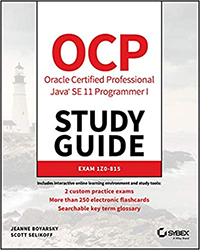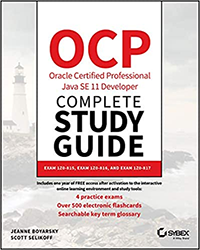
Privileged access was added to the Security objective for Oracle’s Java 11 1Z0-819 Exam, but was not part of the objectives for the now retired 1Z0-816 Exam. We created this Supplemental Material and are releasing it free of charge for all those readers who purchased one of our Java 11 Study Guides. You should read this section carefully before taking the 1Z0-819 Exam. See other changes on The 1Z0-819 Exam page.
Overview
Some Java programs run in an environment where the user does not have full control over the program. In other words, the program runs a privileged action on behalf of the user. The idea for the developer is straight-forward:
- I have a privileged action I need run for a user
- I need to verify the user has the proper permission before running the action
- I need to make sure they are limited in what actions they can run
- I need to make sure they don’t using caching or other tricks to skip the permission check
Java performs a privileged action using the AccessController.doPrivileged() method found in the java.security package. While using this method is not commonly used by most Java developers, it is required knowledge for the 1Z0-819 Exam.
1. The doPrivileged() method
A common example Oracle likes to use is reading a system property. The idea is that the programmer is only allowed to read a specific predefined system property.
1 2 3 4 5 6 7 8 9 10 11 12 | import java.security.*;public class MySecretReader { private static final String KEY = "secret.option"; public String getSecret() { return AccessController.doPrivileged( new PrivilegedAction<String>() { public String run() { return System.getProperty(KEY); } }); }} |
Here KEY is a constant that cannot be changed by the user. The idea here is that a user’s privilege is temporarily elevated so they can read the secret.option value within the system.
2. Ensure Principle of Least Privilege
When executing a privileged action, it is important to ensure that only the minimum access is granted. This is known as the principle of least privilege. Can you spot what’s wrong with the following example?
1 2 3 4 5 6 7 8 9 10 11 | import java.security.*;public class MySecretReader { public String getSecret(String magicWord) { return AccessController.doPrivileged( new PrivilegedAction<String>() { public String run() { return System.getProperty(magicWord); // DON'T DO THIS! } }); }} |
In this example, the caller is able to specify which value they want to read. This is considered a poor practice as it allows them to read any property within the system. Oracle refers this as a tainted input. Put simply, don’t trust anything the user provides when dealing with security. Also use a constant or predefined list to confirm they are accessing only what the original developer intended.
For the exam, be wary of any code that allows the user to access data that they specify, rather than the original programmer.
3. Don’t Expose Sensitive Information
Another important aspect of using doPrivileged() is ensuring sensitive data is protected. For example, can you spot the security risk in this code?
1 2 3 4 5 6 7 8 9 10 11 12 13 | import java.security.*;import java.util.*;public class MySecretReader { private final List<Integer> codes = ... public List<Integer> getSecret() { return AccessController.doPrivileged( new PrivilegedAction<List<Integer>>() { public List<Integer> run() { return codes; // DON'T DO THIS! } }); }} |
Even though codes is marked final, the content can still be modified after the doPrivileged() is complete. This poses an unacceptable security risk. A much safer version would be to return an immutable copy of the list, such as:
6 7 8 9 10 11 | return AccessController.doPrivileged( new PrivilegedAction<List<Integer>>() { public List<Integer> run() { return Collections.unmodifiableList(codes); } }); |
Note that this works because Integer values are immutable. If the contents of the List were mutable, such as List<StringBuilder>, you want to copy them as well.
4. Don’t Elevate Permissions
Privilege elevation or escalation occurs when a user is mistakenly given access to a higher privilege than they should have access to. One way to prevent privilege elevation is to use to the AccessController.checkPermission() method before calling doPrivileged(), then execute the command with limited permissions.
1 2 3 4 5 6 7 8 9 10 11 12 13 14 15 16 17 18 19 20 21 22 23 24 25 | import java.security.*;public class MySecretReader { public void readData(Runnable task, String path) { // Check permission Permission permission = new java.io.FilePermission(path,"read"); AccessController.checkPermission(permission); // Execute task with limited permission final var permissions = permission.newPermissionCollection(); permissions.add(permission); AccessController.doPrivileged( new PrivilegedAction<Void>() { public Void run() { task.run(); return null; } }, // Using a limited context prevents privilege elevation new AccessControlContext( new ProtectionDomain[] { new ProtectionDomain(null, permissions) }) ); }} |
Don’t worry if you can’t write code like this, most developers never have to. For the exam, though, you should understand that the permission is being checked and the action is executed with a specific context.
5. Be wary of Permission Caching
The last rule you need to know for the exam is to be weary of cached permissions. It is perfectly acceptable to cache permission information, but the permission needs to be checked every time the user accesses it.
For example, assuming there’s a User class with appropriate attributes, methods and constructors, can you spot the problem in this code?
1 2 3 4 5 6 7 8 9 10 11 12 13 14 15 16 17 18 19 20 21 22 23 24 25 26 27 28 | import java.security.*;import java.util.*;public class SecretFile { private static Map<String, User> data = new HashMap<>(); public static SecretFile get(String key) { var cacheRecord = data.get(key); if (cacheRecord != null) { // DON'T DO THIS! return cacheRecord.getValue(); } final var permission = Permission permission = new PropertyPermission(key,"read"); AccessController.checkPermission(permission); final var permissions = permission.newPermissionCollection(); permissions.add(permission); var secret = AccessController.doPrivileged( new PrivilegedAction<SecretFile>() { public SecretFile run() { return new SecretFile(); } }, new AccessControlContext(new ProtectionDomain[] { new ProtectionDomain(null, permissions) })); data.put(key, new User(secret, permission)); return secret; }} |
Did you spot it? It might be hard to see, but there’s no permission check when the data is read from the cache! The permission is checked when the data is first read from the cache but not on subsequent calls. We can easily fix this though by checking the permission when it is read from the cache:
6 7 8 9 10 | var cacheRecord = data.get(key);if (cacheRecord != null) { AccessController.checkPermission(cacheRecord.getPermission()); return cacheRecord.getValue();} |
In this example, we see that cached permissions can be safe to use but we have to make sure the permission is validated when it is read the first time and on each request from the cache.
Conclusion
There, you’re done! This post covered the overall topics around Privileged Access that you need to know for the 1Z0-819 Exam. The following bullet points summarize the kinds of things you should be watching for on the 1Z0-819 Exam:
- Always validate user input and never allow it to grant access to arbitrary data
- Never give the user unlimited access to the system
- Prevent privilege elevation by validating security
- Never return privileged objects directly or in a way that they can be modified
- Ensure cached permissions are validated on every call
If you enjoyed this section, you can read more about it in Oracle’s Secure Coding Guidelines for Java SE document.



